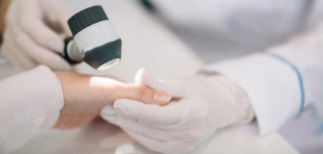Patient Information

Skin cancer is one of the most common types of cancer, and early detection significantly improves outcomes. This document provides an overview of common and rare skin cancers, how to recognise them, and strategies for prevention. It also covers treatment options for precancerous and cancerous skin lesions.
1. Common Types of Skin Cancer
a) Basal Cell Carcinoma (BCC)
- The most common type of skin cancer.
- Appears as a pearly or waxy bump, a red patch, or an ulcer that does not heal.
- Grows slowly and rarely spreads, but requires treatment to prevent local tissue damage.
b) Squamous Cell Carcinoma (SCC)
- Appears as a scaly, red patch, wart-like growth, or non-healing sore.
- Can be aggressive and may spread if untreated.
- Often linked to long-term sun exposure.
c) Melanoma
- A serious type of skin cancer that can spread to other parts of the body.
- Appears as a new or changing mole with irregular shape, uneven colour, or rapid growth.
- Early detection is crucial for successful treatment.
d) Bowen’s Disease (Squamous Cell Carcinoma in situ)
- A precancerous condition appearing as a slow-growing, scaly red patch.
- Can develop into invasive SCC if untreated.
2. How to Recognise Skin Cancer
The ABCDE rule helps identify melanoma and other suspicious skin changes:
- A – Asymmetry: One half of the lesion looks different from the other.
- B – Border: Irregular, blurred, or jagged edges.
- C – Colour: Varied shades of brown, black, red, white, or blue.
- D – Diameter: Larger than 6mm or increasing in size.
- E – Evolving: Any change in size, shape, colour, or symptoms (itching, bleeding).
3. How to Protect the Skin from Skin Cancer
- Apply broad-spectrum sunblock (SPF 30-50) daily and reapply every 2 hours when outdoors during Spring and Summer time.
- Seek shade during peak sun hours (11 am – 3 pm).
- Wear protective clothing, including wide-brimmed hats and UV-blocking sunglasses.
- Avoid tanning beds, as they increase skin cancer risk.
- Perform regular skin self-examinations and seek medical review for new or changing lesions.
4. Treatment of Precancerous Lesions and Skin Cancers
a) Actinic Keratoses (Precancerous Lesions)
- Appear as rough, scaly patches on sun-exposed skin.
- Topical treatments include:
- 5-fluorouracil (5-FU) cream
- Imiquimod cream
- Diclofenac gel
- Photodynamic therapy (PDT)
- Cryotherapy (freezing with liquid nitrogen) for isolated lesions.
Surgical options:
- Curettage & cautery.
b) Bowen’s Disease (SCC in situ)
- Topical treatments: 5-FU, Imiquimod, PDT.
Surgical options:
- Curettage & cautery, excision for persistent lesions.
c) Basal Cell Carcinoma (BCC)
- Topical treatments (for superficial BCCs): Imiquimod, 5-FU.
Surgical options:
- Curettage & cautery for small BCCs.
- Excision for larger or deeper tumours.
- Mohs micrographic surgery for high-risk cases.
Non-surgical treatment option:
- Radiotherapy.
d) Squamous Cell Carcinoma (SCC)
- Requires surgical excision with adequate margins.
- Mohs surgery for high-risk or recurrent SCCs.
- Radiotherapy for patients unsuitable for surgery.
e) Melanoma
- Wide local excision with appropriate margins based on tumour thickness.
- Sentinel lymph node biopsy in selected cases.
- Advanced melanoma may require targeted therapy or immunotherapy.
5. Rare Skin Cancers
a) Merkel Cell Carcinoma
- An aggressive neuroendocrine tumour appearing as a firm, red or purple nodule.
- Requires surgical excision, often with radiotherapy or immunotherapy.
b) Atypical Fibroxanthoma
- A rare tumour seen in elderly patients on sun-damaged skin.
- Managed with surgical excision.
c) Plexiform Dermal Sarcoma
- A rare soft tissue tumour that can resemble dermatofibrosarcoma protuberans (DFSP).
- Requires wide local excision.
d) Sebaceous Carcinoma
- A rare but aggressive tumour arising from sebaceous (oil) glands, commonly in the eyelid.
- Requires surgical excision, sometimes with radiotherapy.
Early detection and prompt treatment of skin cancers lead to better outcomes. If you notice any unusual skin changes, consult a dermatologist.
Prepared by Dr Sega-Hall
BOOK A CONSULTATION
To book an appointment or to request more information please fill out the form below and we will be in touch shortly. Any information that you provide will remain strictly confidential.